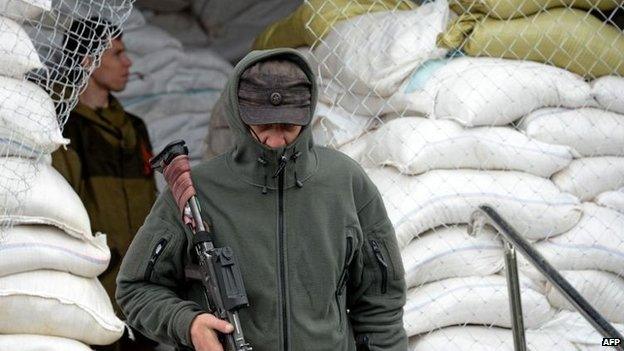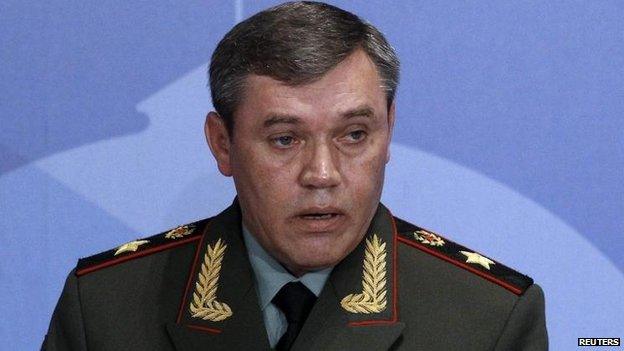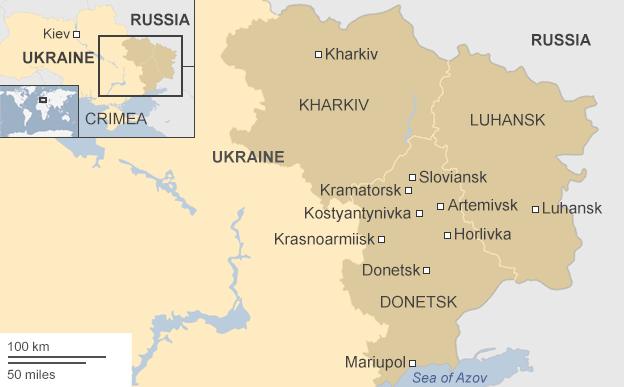Ukraine crisis: Russia condemns US 'Iron Curtain' sanctions
- Published

Armed pro-Russian activists continue to occupy government buildings in east Ukraine
Russia has condemned new US and EU sanctions that have been imposed over Moscow's actions in Ukraine.
Deputy Foreign Minister Sergei Ryabkov said "Iron Curtain"-style US sanctions might harm its hi-tech sector and that the EU was "under Washington's thumb".
Russia had no intention of invading eastern Ukraine, where separatists have seized government buildings, he added.
Later, the regional governor's headquarters in the city of Luhansk, near the Russian border, was stormed.
The AFP news agency reported that a crowd of more than 3,000 people, led by about 20 youths armed with metal bars, was attempting to take over the building.
Police were firing tear gas in an effort to push them back, Interfax-Ukraine said.
Pro-Russia activists seized the Security Service of Ukraine building in Luhansk three weeks ago.
'Washington's bidding'
Mr Ryabkov told the online newspaper Gazeta.ru that the US sanctions were "a blow to our hi-tech enterprises and industries".
He added: "This is a revival of a system created in 1949 when Western countries essentially lowered an 'Iron Curtain', cutting off supplies of hi-tech goods to the USSR and other countries."
A Russian foreign ministry statement said the EU was "doing Washington's bidding with new unfriendly gestures towards Russia".
It added: "If that is how someone in Brussels is hoping to stabilise the situation in Ukraine, then it is a clear indication of a complete lack of understanding of the interior political situation in the country... Are you not ashamed?"
On Monday, the US announced new sanctions targeting seven Russian individuals and 17 companies which Washington says are linked to President Vladimir Putin's "inner circle".
On Tuesday, the European Union published a fresh list of 15 individuals facing travel bans and asset freezes.
The European Union's list, external includes Gen Valery Gerasimov, chief of the Russian General Staff, and Lt Gen Igor Sergun, identified as the head of the Russian military intelligence agency, the GRU.
It also includes Russian Deputy Prime Minister Dmitry Kozak and pro-Russian separatist leaders in Crimea and in the eastern Ukrainian cities of Luhansk and Donetsk.
The BBC's Matthew Price in Brussels says this list does not appear to follow the US line in targeting President Putin's associates, but rather those involved in events on the ground in Ukraine.
Vyacheslav Ponomarev, the self-styled "mayor" of Sloviansk, which is controlled by pro-Russian activists, said the imposition of the sanctions "does not aid dialogue but only aggravates the situation".
The activists continue to detain some 40 people, including seven military observers linked to the Organization for Security and Co-operation in Europe who were seized last week.
The US and EU first imposed visa bans and asset freezes on a number of senior Russian officials and companies after Moscow annexed Crimea from Ukraine last month.
In his interview, Mr Ryabkov insisted that Moscow was "not at all inclined to repeat the so-called Crimea scenario in south-eastern Ukraine. There are no grounds to fear this".

Valery Gerasimov, Russian armed forces chief of staff - now on the EU sanctions list
On Monday, the US said that Russian Defence Minister Sergei Shoigu had also told American counterpart Chuck Hagel in a phone call that "Moscow has no plans to invade Ukraine".
Mr Shoigu announced that Russian troops had returned to their "permanent positions" after conducting military exercises on the border with Ukraine.
Sarah Rainsford saw pro-Russians clash with a group marching for a united Ukraine
However, Nato said on Tuesday it had "no information that indicates a withdrawal of Russian troops from the Ukrainian border".
Moscow has expressed concern over an "unprecedented" increase in US and Nato military activity near Russia's borders.
The US has sent 600 troops to Poland and the Baltic states. Washington says it has deployed the extra troops to reassure Nato allies.
Mr Shoigu condemned the US and Nato for "provocative" statements about the need to "contain" Russia.
In other developments on Tuesday:
The EU announces it will meet Russia and Ukraine on Friday to discuss gas supplies
The mayor of Kharkiv, Gennady Kernes, is stable in hospital in Israel, where he was flown after being shot in the back on Monday
Forum begins in London to start process of trying to recover stolen Ukrainian assets
German government distances itself from ex-Chancellor Gerhard Schroeder after he reportedly partied with Mr Putin in St Petersburg on Monday
